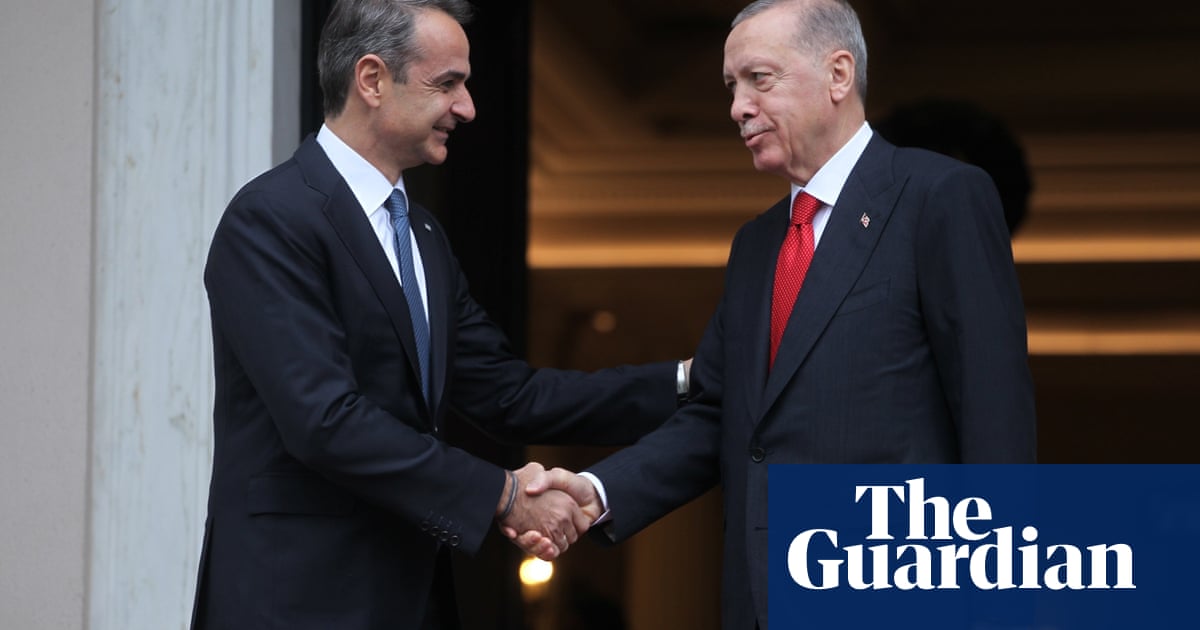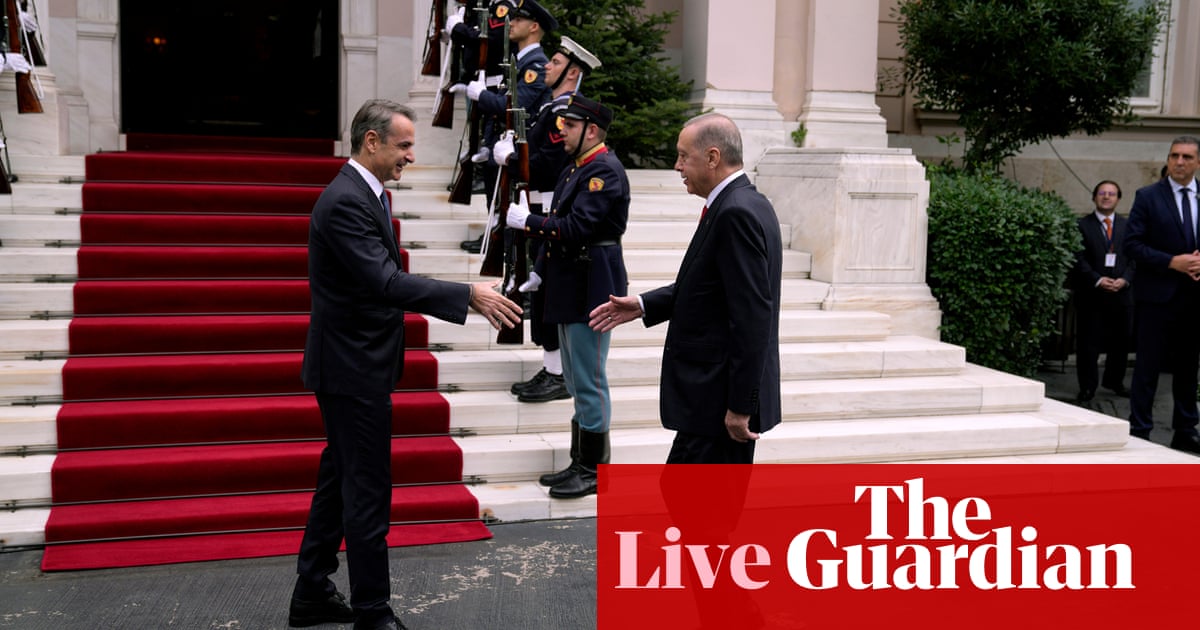
Greece and Turkey have sought to put years of tensions behind them with a friendship accord signed during a historic visit to Athens by the Turkish president, Recep Tayyip Erdoğan.
The two Nato members – longtime foes in the air and sea – agreed to reset ties, sealing a “declaration on good neighbourly relations” which, it is hoped, will pave the way to settling disputes that have defied resolution for decades, including over undersea energy resources and the divided island of Cyprus.
Ushering in what he called a “new era”, Erdoğan said the nations could be “an example to the world”. “There is no issue between us that is unsolvable. So long as we focus on the big picture and don’t end up like those who cross the sea and drown in the river,” the 69-year-old said after meeting the Greek prime minister, Kyriakos Mitsotakis. “We want to turn the Aegean into a sea of peace.”
In an earlier meeting, he had said: “I believe it will be better for the future of both sides to see the glass half full.”
The 10-point declaration, endorsed after longer-than-anticipated talks between the leaders, is regarded as a roadmap to cementing closer ties after an especially volatile period in which military confrontation over Aegean offshore energy resources was only narrowly averted in 2020.
Diplomats in Ankara and Athens had spent months working on the declaration. The document exhorts the countries to keep channels of communication open, pursue military confidence-building measures to eliminate sources of tension, and increase trade while working on differences that have long kept them apart.
“Geography and history has dictated that we live in the same neighbourhood,” said Mitsotakis, 55. Acknowledging that there would be people in Greece and Turkey who did not want detente, he added: “I feel a historical responsibility to utilise this opportunity to bring the two states side by side, just as our borders are.”
The doors to rapprochement were cautiously prised open this year when Athens sent rescue teams to Turkey within hours of the country being struck by a devastating earthquake in February and Erdoğan reacted swiftly to a deadly train crash in central Greece.
Reconciliation is not expected to be easy. Among many obstacles are differences over the continental shelves the two are entitled to in the Aegean, airspace over the sea, underwater oil and gas deposits, and Cyprus. The eastern Mediterranean island has been divided between Greek Cypriots in the internationally recognised republic in the south and Turkish Cypriots in the breakaway north since Ankara, responding to a coup aimed at a union with Greece, sent in troops in 1974.
The failure to reunite Cyprus had been an impediment to improving Greek-Turkish ties, but Mitsotakis and Erdoğan, both keen to focus on their economies, appear determined to repair relations, and it was agreed that the volume of trade between the two countries would be doubled from $5bn to $10bn annually. Greece is enjoying a growth spurt after a decade-long debt crisis, and it is hoped that Turkey, a market of 80 million people, will become an important trading partner. Erdoğan, who has been fighting crippling inflation, is eager to attract foreign investors.
Ankara also sees better relations with Greece as key to repairing strained ties with the EU and wider west.
In addition to the declaration on good neighbourly relations, 15 accords were signed in Athens by Greek and Turkish cabinet ministers in a sign, analysts say, of the significance of Erdoğan’s visit. Among them was a 12-month automatic visa system that will allow Turkish nationals to visit Greek islands without applying for a visa. Illegal migration flows were also addressed in a groundbreaking accord under which Greek coastguard officials will be installed in Smyrna and members of the Turkish coastguard sent to Lesbos.
“There’s no doubt that, just as in the 1990s, both countries were united this year by bonds of common suffering, allowing the governments to move ahead with rapprochement and providing the legitimacy for it to be accepted,” said Harry Tzimitras, director of the Peace Research Institute Oslo in Cyprus.
Tzimitras said that mending fences with Greece underscored Turkey’s desire to pursue a policy of wider reconciliation. “It is part of rapprochement with the broader west,” he said.
The six-hour visit took place six years to the day after Erdoğan last flew into Athens, making what was a first trip to the country by a Turkish president in 65 years.
Thursday’s tour could not have been more different in tone or rhetoric. While in 2017 Erdoğan had glared at his hosts, crossing perceived “red lines” and taking them to task over an array of issues including management of Ottoman sites – a legacy of 400 years of Ottoman rule – this time there were neither imperiousness nor stony-faced expressions but good humour and warm handshakes as the man the Greek media has frequently described as a modern-day sultan smiled broadly before the cameras.
Erdoğan, pundits agreed, had been a different person, a man Greece could perhaps do business with. It was only the start, but it augured well.












